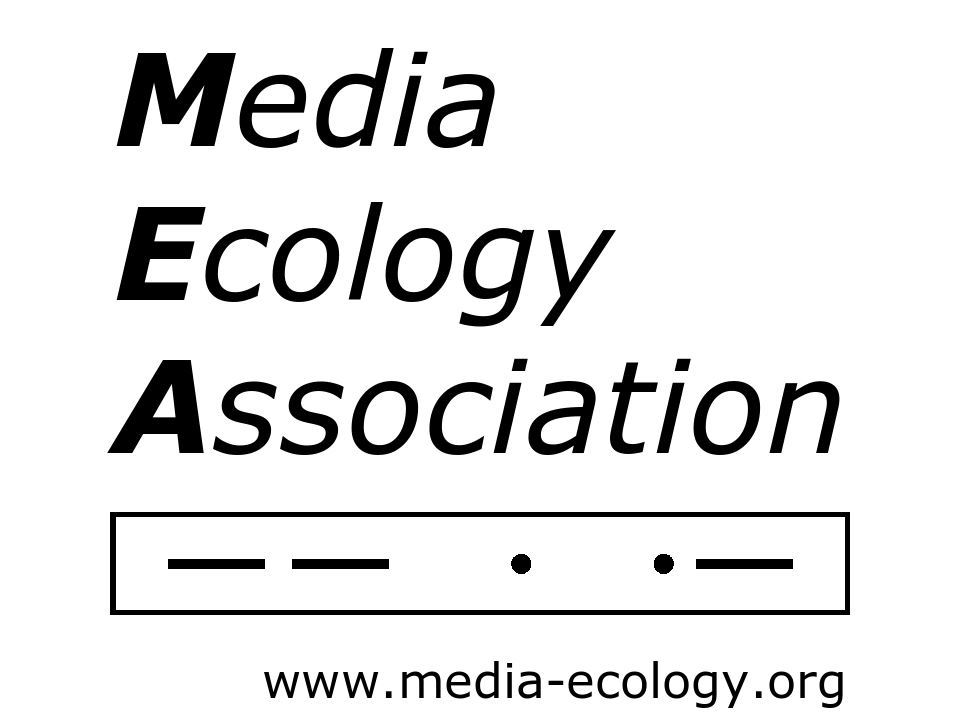The Official Newsletter for the Media Ecology Association
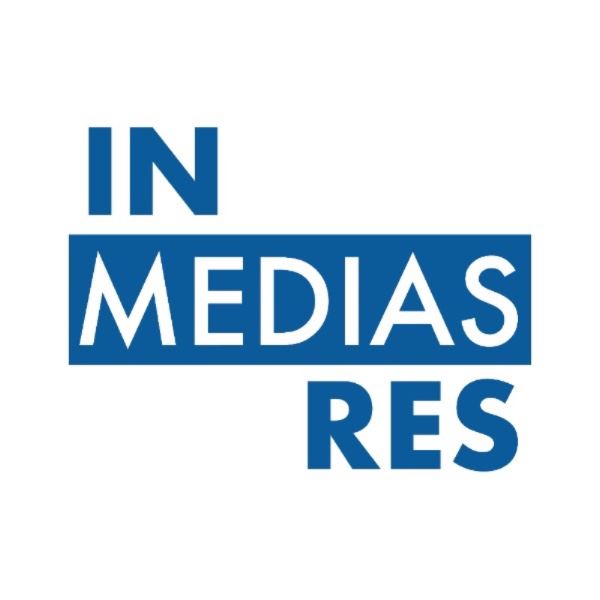

January 2021 Newsletter
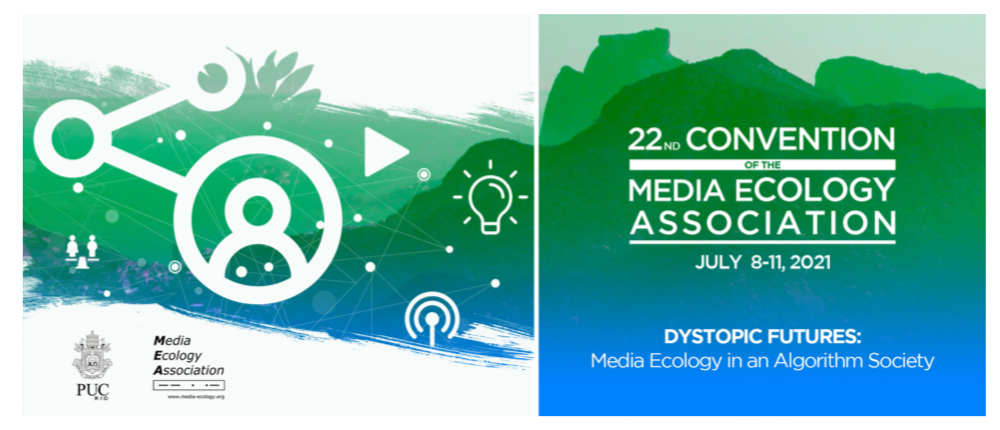
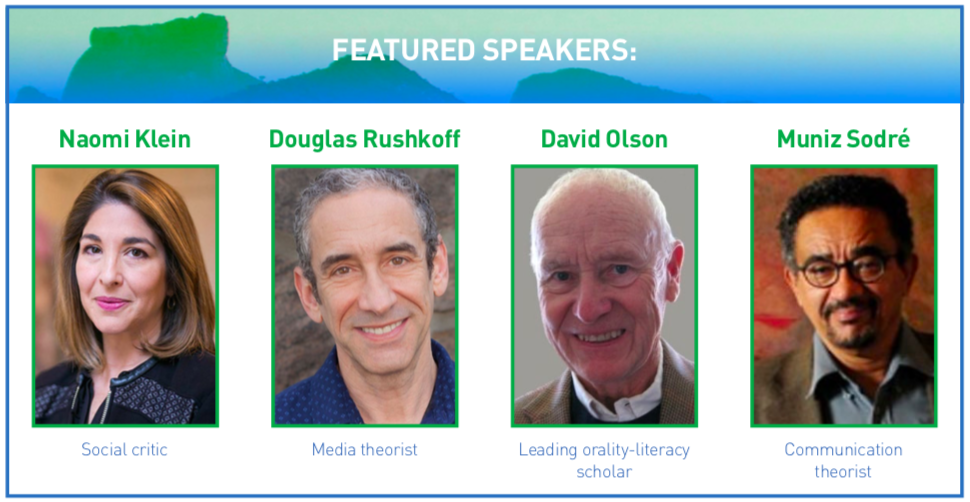
EXTENDED AND REVISED CALL FOR PAPERS
The Twenty-Second Annual Convention of the Media Ecology Association
To Be Held Virtually Via Zoom
Dystopic Futures – Media Ecology in an Algorithm Society
July 8–11, 2021
Extended Deadline: February 15, 2021
“Media ecology looks into the matter of how media of communication affect human perception, understanding, feeling, and value; and how our interaction with media facilitates or impedes our chances of survival.” (Neil Postman, 1970). “It is the study of media environments, the idea that technology and techniques, modes of information and codes of communication play a leading role in human affairs.” (Lance Strate, 1999)
THE MEDIA ECOLOGY ASSOCIATION (MEA) invites the submission of abstracts of papers and proposals for panels for presentation at its 22th Annual Convention, which will be held from 8 to 11 July, 2021. In light of the effects of the pandemic on health and travel, we have decided to postpone hosting our annual meeting at Pontifical Catholic University of Rio de Janeiro, Brazil until 2022, and will once again hold our convention online via Zoom. The deadline for submission is 15 February 2021.
The annual meeting of the MEA provides an opportunity for our community of scholars, educators, professionals and practioners to exchange experiences and ideas in a friendly environment. Participants at MEA conventions address a wide diversity of topics in our programs, and we encourage submissions that explore media ecological approaches from any number of different disciplines and fields of knowledge and social practice. We are interested in papers, thematic panels, roundtable discussion panels, creative projects, performance sessions, and other proposals of interest to media ecologists.
While we are open to explorations on any topic of interest to media ecologists, we also include a convention theme with the aim of generating further discussion and probes involving multiple perspectives. Submissions do not have to address the theme, but are invited to do so.
THE THEME OF THE 2021 CONVENTION is Dystopic Futures: Media Ecology in an Algorithm Society. Dystopian societies are represented in a variety of science fiction works as an effort to predict pessimistic consequences of our current practices. Films, books and other forms of art set their narratives in the future, to comment on our present culture while maintaining critical distance. However, nowadays we are living in a sort of dystopic present with undesirable and frightening realities. In addition to our natural, environmental, political, ethical, cultural, health and social problems, we have to deal with issues brought by technological advances. We are living in a technopoly (Postman, 1992), or in what some recent authors call an algorithmic society, “a society organized around social and economic decision-making by algorithms, robots, and AI agents, who not only make decisions but also, in some cases, carry them out” (Balkin 2016). What kind of dystopia can we envisage as consequence of our dystopic present?
General topics of interest related to the convention theme (but not limited to):
- Fake news, and social media: discursive breakdown and political consequences.
- Robots and transhumanism
- Algorithmic media: data mining, subjectivity modelling and decision-making
- Big Data, machine learning, AI, and society
- Limits of AI development: is it reasonable to talk about an AI take over?
- Movies and literature: mapping different kinds of dystopias.
- Pandemics, economic crash, irreversible climate changes and other disasters: what now?
- Any new (and better) world order on the horizon? Is avoiding dystopia possible?
- Is media regulation still possible? In what sense and by what means?
- Discourse and education in the era of technology hegemony.
- Politics, health, citizenship, and media
- Disinformation, censorship, and propaganda
- Crazy talk and stupid talk in digital media
- Orality and digital literacy in a dystopic world
- Arts, technology, and cultural legacy
- Utopia, dystopia and media ecology studies
GUIDELINES FOR SUBMISSION
Please submit paper and panel proposals, in English, by February 15, 2021 to MEA2021Convention@gmail.com. A maximum of two submissions per author will be accepted. Authors who wish their papers to be considered for the Top Paper or Top Student Paper award must indicate this on their submission(s).
Submission Guidelines for paper and panel proposals:
- Include title(s), abstract(s) (maximum 250 words), and contact information for each participant.
- Outline, as relevant, how your paper or panel will fit with the convention theme.
- Authors with papers submitted as part of a panel proposal or as a paper proposal that wish to be considered for Top Paper or Top Student Paper must send the completed paper to the convention planner by May 5, 2021.
Submission guidelines for manuscripts eligible for MEA award submissions:
- Manuscripts should be 4,000–6,000 words (approximately 15 to 25 double-spaced pages)
- Include a cover page with your institutional affiliation and other contact information.
- 3. Include an abstract (maximum 150 words).
INFORMATION
Please direct questions to convention coordinator Adriana Braga, MEA2021Convention@gmail.com. For more on the Media Ecology Association, visit https://www.media-ecology.org.
Download a PDF version of this CFP in English (or in Portuguese) to print or share!
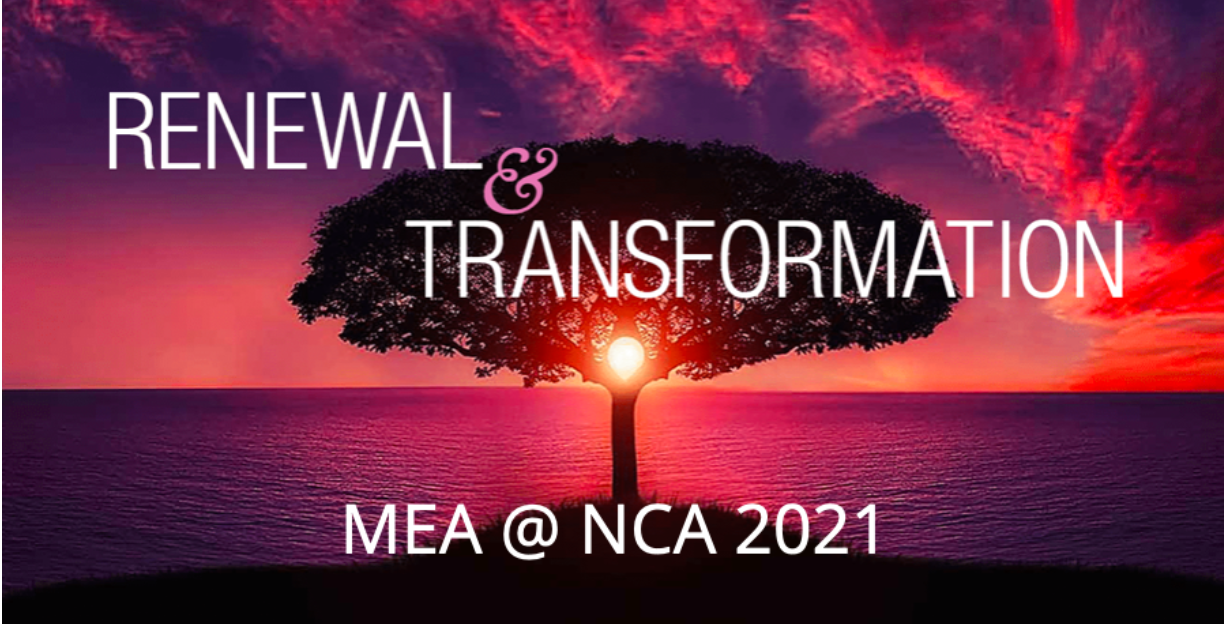
Call for Competitive Papers and Complete Panel Proposals
The Media Ecology Association
at the 107th Annual Convention of
The National Communication Association
Seattle, WA
November 18–21, 2021
“Renewal & Transformation”
Submissions Open: January 11, 2021
Submissions Close: March 31, 2021 at 11:59 PM Pacific Standard Time
MEA @ NCA Program Planner: Michael Plugh, mplugh01@manhattan.edu
The Media Ecology Association welcomes submissions for the 2021 National Communication Association convention, centered on the theme of Renewal and Transformation. NCA’s annual gathering offers our community an opportunity to renew our associations, as we engage in the important rituals of community building and affirmation. After a trying period of physical distancing and compromise, we look forward to meeting, once again, to share questions, ideas, and good spirits, and to make sense of the many transformations this period has presented. How have our communities been transformed by these recent times and their challenges? In what ways can we renew old associations as a means by which to navigate a path forward?
This call invites you to explore these concerns, emphasizing the historical and intellectual roots of our field, and their relevance to the theme of Renewal and Transformation. As such, papers and panels that deal with topics related to the theme are encouraged (though not required). Likewise, proposals that link traditionally distinct thinkers or disciplines to media ecology, extend established ideas or concepts, or otherwise advance existing approaches to the field, are also welcomed.
Submission Method and Deadline
Online submission will be accepted through the NCA Convention Central website beginning January 11, 2021. The absolute deadline for submissions is March 31, 2021 at 11:59 PM Pacific.
Types of Submissions
Interested colleagues are encouraged to submit individual papers, paper sessions, and/or panel discussion proposals that address the convention theme as it relates to the study of media ecology. (Strict adherence to the NCA convention theme is, again, not a requirement for submission). The MEA program will accept the following three types of submissions: individual papers, paper sessions (common theme paper presentations); and panel discussions (common topic roundtable discussion).
-
Individual Papers: All paper submissions should include an uploaded file between 20 and 25 pages (double-spaced) in length, including references and tables, and have (a) a title; (b) a 250–500-word description; and (c) no personal identification of the author in the abstract or throughout the paper upload. Please remove all personal identification before uploading the document online. Individual papers will be evaluated on the basis of the following criteria: (a) a firm grounding in the established literature; (b) sound arguments with well-substantiated ideas; (c) clear expression of ideas; (d) a clear media-ecological orientation; and (e) a contribution to the general understanding of media ecology. If your submission is a student paper, please be sure to indicate this. Also, submitters should indicate their willingness to present as part of a Scholar-to-Scholar (S2S) program session.
-
Paper Sessions comprise a group of authors with papers to present centered upon a common theme. Paper Session proposals must include (a) a session title and description describing the session’s overall focus; (b) indicate the session chair and respondent; (c) the title of each paper on the session and author information; (d) an abstract of no more than 75 words for each paper; and (e) a rationale of no more than 250 words for the session. Paper sessions should include individuals representing multiple institutions rather than individuals from only one or two institutions. Further, a single person should not serve more than one role (i.e., chair, respondent, author, or presenter) in a submission.
-
Panel Discussions comprise a group of panelists who discuss a specific topic. Submitters may use the exact same text for both the abstract and rationale if they do not wish to create a separate rationale (reviewers will use the rationale when evaluating this type of panel). Complete panel discussion proposals in this format will therefore include (a) a panel title describing the panel’s overall focus; (b) a list of all presenters, with their affiliations; (c) an abstract of no more than 250 words; and (d) a rationale of no more than 250 words. Panel discussions should include individuals representing multiple institutions rather than individuals from only one or two institutions. Further, a single person should not serve more than one role (i.e., chair, respondent, author, or presenter) in a submission.
All panel discussion or paper session proposals will be evaluated on the basis of the following criteria: (a) solid organization and preparation, with clear indication of the focus and rationale of the panel; (b) clear, strong integration/coherence among the topics of the individual papers or presentations; (c) interest to MEA members; (d) a clear media- ecological orientation; and (e) a contribution to the general understanding of media ecology. All submitters are also asked to consider creative collaborations and co- sponsorship with other units. Co-sponsorhip opportunities should be noted in the “special requests” tab.
The MEA has six session slots available for this convention. As a standard practice, paper sessions consisting of competitively refereed and accepted complete papers will receive priority ranking and scheduling privilege. Also, since we have limited panel allocations and hope to engage more of our colleagues in the MEA’s program, we urge all prospective contributors to send in only one submission—one complete paper or participation on only one proposed panel. Please also note that NO identical submissions may be made to more than one unit.
NCA Policy: Audio/Visual Equipment
NCA policy entails providing reasonable A/V support of presentations at its annual convention. However, equipment requests must be kept to a minimum because of their high cost. Submitters must therefore adhere to the following guidelines:
- A/V equipment requests MUST be made at the same time as the paper or panel’s submission, and will be screened by the program planner.
- NCA will normally approve requests for the following equipment: laptop audio, Internet connection and LCD projectors.
- NCA will NOT normally approve requests for equipment such as laptops, transparency projectors, VCR or DVD players, camcorders, satellite links, or teleconference/webinar equipment.
Individuals may, of course, elect to rent equipment for the convention at their own expense.
All submitters are encouraged to review the Professional Standards for Convention Participants prior to submission. Helpful resources (including the Professional Standards for Convention Participants), such as live and recorded step-by-step instructions on how to submit, are available in the NCA Convention Library (http://www.natcom.org/conventionresources).
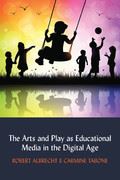
The Arts and Play as Educational Media in the Digital Age
Peter Lang's "Understanding Media Ecology" series most recent release is The Arts and Play as Educational Media in the Digital Age by Robert Albrecht and Carmine Tabone. The digital revolution we are now entering as educators is an unchartered sea pregnant with wondrous possibilities but laden with a minefield of unforeseen consequences. A pedagogy that overlooks or downplays the disruptive and often dangerous influence of digital media on childhood development is necessarily a very shortsighted one.
More than just highlighting our misgivings about digital media, however, this book has a purpose far more ambitious and infinitely more useful. Based upon 45 years of work with young people in Jersey City classrooms, day camps, housing projects, libraries, church basements and community centers, the authors propose a pedagogical strategy that uses hands-on experiences in the arts as a strategy to offset and counterbalance the dominance of digital media in the lives of children.
Rather than call for the elimination of digital media—clearly an impossibility even if it were desirable—the authors maintain that children need to be exposed to non-digital, non-electronic experiences that cultivate alternative ways of thinking, feeling, and being in the world. In sum, the book does not call for an end to the digital, but outlines ways in which the arts and creative forms of play help to establish a balance in the education and socialization of children as we enter more deeply into the Digital Age.
For more information and purchasing options, please visit the book's page on Peter Lang's website.
Call for Papers - EME’s 20th Anniversary
Call for Papers: Invited special issue in celebration of EME’s 20th anniversary.
Issue: 20:4
We welcome contributions that celebrate the 20th anniversary of the Explorations in Media Ecology: The official Journal of the Media Ecology Association. Contributions can come in the form of analyses, essays, poetry, art, reviews, etc. Possible topics welcomed in the issue, but not limited to: Past and future trends in the journal or media ecology Discussion of influential articles, poetry, art, reviews Inspirational authors of the MEA Traditions kept alive by the journal and ME.

Call for Submissions for Explorations in Media Ecology Vol. 20
All articles submitted should be original work and must not be under consideration by other publications.
Explorations in Media Ecology, the journal of the Media Ecology Association, accepts submissions that extend our understanding of media (defined in the broadest possible terms), that apply media ecological approaches and/or that advance media ecology as a field of inquiry.
As an interdisciplinary and multidisciplinary publication, EME welcomes contributions embracing diverse theoretical, philosophical and methodological approaches to the study of media and processes of mediation through language, symbols, codes, meaning and processes of signification, abstracting and perception; art, music, literature, aesthetics and poetics; form, pattern and method; materials, energy, information, technology and technique; mind, thought, emotion, consciousness, identity and behavior; groups, organizations, affiliations, communities; politics, economics, religion, science, education, business and the professions; societies and cultures; history and the future; contexts, situations, systems and environments; evolution and ecology; the human person, human affairs and the human condition; etc.
EME publishes peer-reviewed scholarly articles, essays, research reports, commentaries and critical examinations, and includes several special features. Our Pedagogy Section focuses on teaching strategies and resources, pedagogical concerns and issues relating to media ecology education; we are particularly interested in articles that share great ideas for teaching (GIFTs) media ecology in the classroom. The Probes Section features short items that are exploratory or provocative in nature. Creative writing on media ecological themes can be found in our Poetry Section. Questions and matters of concern to media ecology scholars are taken up in our Forum Section. And our Review Section includes individual book reviews and review essays.
EME is a refereed journal. Strict anonymity is accorded to both authors and referees. References and citations should follow the Harvard Referencing system, and the journal otherwise follows standard British English for spelling and punctuation.
Submissions can be uploaded online at: https://callisto.newgen.co/intellect/index.php/EME/submissions
Direct inquiries to
Working Group for Increasing Inclusivity
Following a special workshop in the MEA convention, organized by Carolin Aronis (University of Colorado, Boulder), Peggy Cassidy (Adelphi University), Rachel Armamentos (Fordham University), and Bernadette Ann Bowen (Bowling Green State University)—sixteen MEA members volunteered to become new members of this group. Three of them stepped forward to lead the group. The new group members include board members, faculty, graduate and undergraduate students, all from different institutions and countries, and some are more new to the MEA while others are long standing members.
Multiple issues to strengthen MEA and the Media Ecology as a field of study were identified through the convention session (thank you for all contributors!). Currently, the three leaders are meeting the board member Carolin Aronis to create goals and objectives that will align with the vision of MEA.
MEA members who would like to volunteer, or provide any insight, please write to carolin.aronis@colostate.edu.
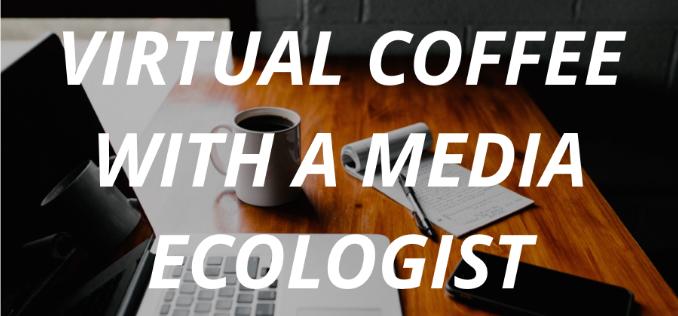
Virtual Coffee with a Media Ecologist
Are you interested in media ecology and have some questions about it? Are you working on a study related to media ecology and searching for advice? Are you an instructor looking for a media ecology expert to invite as a virtual guest speaker to one of your classes?
Get in touch with us! We are happy to schedule a “virtual coffee” appointment with you. Simply fill out the form below to set up a short call or virtual meeting with a scholar from the MEA.
The format is open to all. We especially encourage students and early-career scholars interested in media ecology to get in touch with us.
Do you have a background in media ecology and would like to volunteer for virtual coffee meetings with those looking to learn more about it? Send an email to Julia M. Hildebrand at hildebjm@eckerd.edu.
Arrange a Virtual Coffee appointment on our website.
MEA Member News and Achievements
New Book by Corey Anton, How Non-Being Haunts Being: On Possibilities, Morality, and Death Acceptance
Corey Anton is happy to announce the release of his latest book. Please try to get it into your local libraries.
How Non-Being Haunts Being: On Possibilities, Morality, and Death Acceptance, published by Fairleigh Dickinson University Press.
How Non-being Haunts Being reveals how the human world is not reducible to “what is.” Human life is an open expanse of “what was” and “what will be,” “what might be” and “what should be.” It is a world of desires, dreams, fictions, historical figures, planned events, spatial and temporal distances, in a word, absent presences and present absences.
Corey Anton draws upon and integrates thinkers such as Jean-Paul Sartre, Henri Bergson, Kenneth Burke, Terrence Deacon, Lynn Margulis, R. D. Laing, Gregory Bateson, Douglas Harding, and E. M. Cioran. He discloses the moral possibilities liberated through death acceptance by showing how living beings, who are of space not merely in it, are fundamentally on loan to themselves.
A heady multidisciplinary work, How Non-being Haunts Being explores how absence, incompleteness, and negation saturate life, language, thought, and culture. It details how meaning and moral agency depend upon forms of non-being, and it argues that death acceptance in no way inevitably slides into nihilism. Thoroughgoing death acceptance, in fact, opens opportunities for deeper levels of self-understanding and for greater compassion regarding our common fate. Sure to provoke thought and to stimulate much conversation, it offers countless insights into the human condition.
How Non-being Haunts Being makes much ado about nothing. A nimble scholar and graceful writer, Corey Anton explains why and how “human experience and reality as a whole can show itself for what it is only as we grasp how nothing or non-being relates to being.” Revelatory and provocative. Timely and important.
—Sheldon Solomon, Skidmore College
Table of Contents:
Preface
Chapter 1: Nothing at the Heart of Existence
Chapter 2: Life and Many Modes of Bodily Non-Being
Chapter 3: Language, Absence, Negation, and Context
Chapter 4: Death and the Possibilities of Human Morality
Chapter 5: A Mythological/Mathematical Postscript
You can order it from the publisher at https://rowman.com/ISBN/9781683932840/How-Non-being-Haunts-Being-On-Possibilities-Morality-and-Death-Acceptance and get a 30% off discount if you use this code: UP30AUTH21.
Anton presented three papers at NCA, all on parts of the book, which you can find here: https://www.youtube.com/watch?v=LEBKf4aWiNI
“Canadian Culture” Podcast
Musician, author, and educator Dr. Rea Beaumont has launched the podcast “Canadian Culture” that highlights the country’s diverse cultural heritage. The first episode features an interview with Andrew McLuhan, Director of the McLuhan Institute, discussing the groundbreaking work of Marshall McLuhan and Eric McLuhan.
http://www.canadianculturepodcast.com
CALL FOR NEWSLETTER CONTENT
To submit your news to In Medias Res, the official monthly newsletter of the Media Ecology Association, members can click here for the submission form.
We are looking for news that is relevant to the members of MEA. This might include member achievements (i.e., journal publications, books, creative works, etc.), awards received, upcoming relevant conferences, recent books that MEA members should be aware of, web content that might interest MEA members, news about upcoming EME issues, calls for submissions, etc.
The deadline for submissions to be included in the next month’s newsletter is the 28th of every month at 5pm EST.
Donate to MEA through AmazonSmile
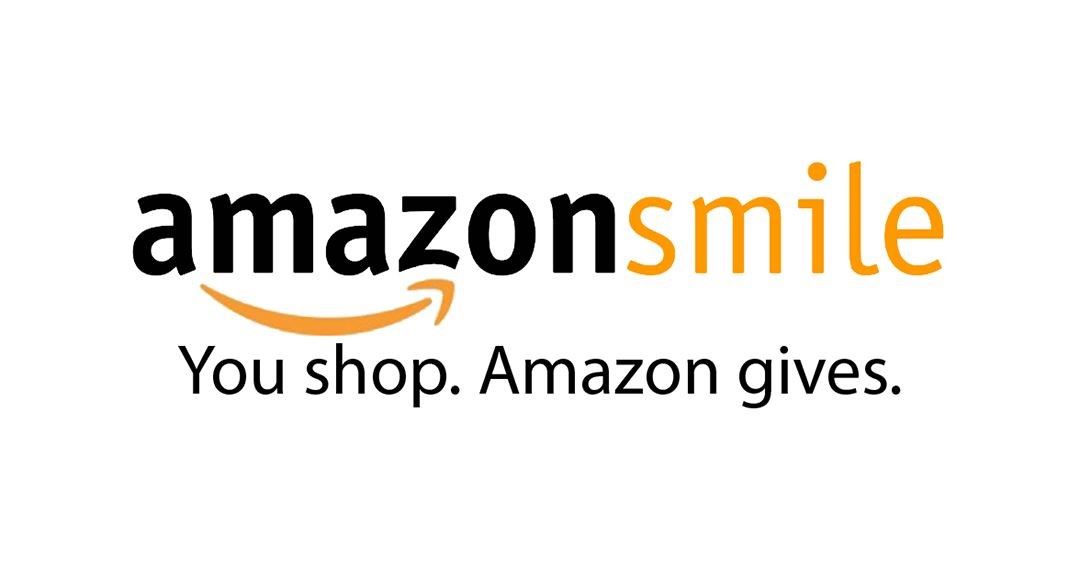
When you order through AmazonSmile, the AmazonSmile Foundation will donate 0.5% of the purchase price of eligible products to the charitable organization of your choice.”
To use it, go to smile.amazon.com and sign in as you usually do. Directly under the search bar, you will find a pull-down for supported charities. Search for and select Media Ecology Association.
